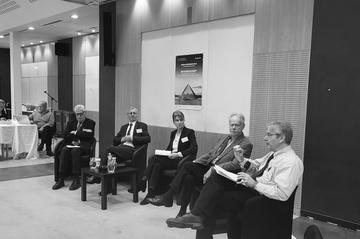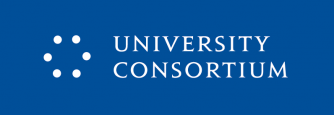UC Annual Conference 2023: Reflections on the Keynote Panel Discussion
Mikael Pir-Budagyan
At the 2023 Annual Conference we asked our UC Fellows to reflect on the final keynote discussion. Here is Mikael's excellent reflection of the panel.
The 2023 University Consortium Annual Conference explored the effects of the war in Ukraine on the evolution of the international system and the international system’s effects on the evolution of the war. The keynote panel featured four esteemed speakers, Sir Laurie Bristow, Professor John Ikenberry, Professor Robert Legvold, and Ambassador Pierre Vimont, representing both the academic and policy worlds. They directly confronted the central question, offering profound insights drawn from their rich and diverse experience. The following is a reflection on the contributions made by the panelists during their presentations and the ensuing discussion.
In recent years, the global order was challenged by the far-reaching consequences of the COVID-19 pandemic and fissures within the global supply chain, the intensifying strategic rivalry between the United States and China, and Russia’s brutal invasion of Ukraine to name just a few. When assessing these trends, some panelists highlighted the resilience of the Western alliance, particularly in its support for Ukraine. Others sounded a cautionary note, stressing the potential breakdown of the post-World War II rules-based international order.
Although it may be premature to predict the detailed contours of the forthcoming international system, its challenges are already discernible on the horizon. Against this backdrop, a question kept coming back to my thinking about the panel: how can states navigate these tectonic shifts while upholding their core values?
A consensus emerged among the presenters that Russia’s invasion of Ukraine served as a catalyst for various existing trends, consolidating and reinforcing their significance. One of the speakers suggested that the crucial first step in addressing the threats and consequences of this war is to recognize it as an irreversible turning point. The sooner policymakers embrace this reality, the more adeptly they can confront the impending shocks. If the pandemic posed a challenge to international cooperation, Russia’s invasion has gone further, ravaging the foundational principles underpinning it. As the stakes continue to rise, it is imperative to become proactive and agile when adopting policy responses.
The invasion has laid bare the dysfunctionality within the global governance system. The Security Council (UNSC) has faced intense scrutiny due to its persistent deadlock over Russia’s Charter violations, while the General Assembly, representing the broader international community, has consistently condemned Moscow’s actions. The current crisis in the Middle East seems to confirm the UNSC’s paralysis. One panelist pointed out that the UNSC is in dire need of reform, even as, they noted, it is clear that such reform is hardly possible at present. As a result, we have seen a proliferation of “minilateral” arrangements characterized by limited binding rules, high levels of pragmatism, and ad hoc applicability, circumventing the once-celebrated global rules. These formats have garnered even greater favor among middle powers, whose growing capabilities empower them to exert influence within their regions and on a broader international scale. The United States has also recognized the value of minilateralism, which is evident in arrangements such as the Indo-Pacific Economic Framework or Quad.
Nearly two years since the start of the full-scale invasion, we have witnessed a systematic dismantling of the strategic non-proliferation agenda, with consequences extending far beyond the European theater. Concurrently, the intensifying U.S.-China rivalry, particularly in critical technologies, amplifies the risks of a widening divide between major powers. Beyond the rhetoric of de-risking and de-coupling lies the peril of further fragmentation of global cooperative regimes, including arms control and the management of artificial intelligence (AI). While recent efforts by Washington and Beijing to establish communication channels on AI innovation offer a glimmer of hope for addressing its associated threats, the panelists contended that the efficacy of such efforts diminishes as countries increasingly shy away from collaborative endeavors in other domains.
The panelists stressed the importance of avoiding path dependency when it comes to solving international crises. They observed that sanctions have become the primary tool of pressure applied without proper consideration or creativity. For example, Russia’s invasion and Western attempts to isolate Moscow through a robust sanctions regime have, at the same time, eroded the collaborative efforts on pressing global challenges such as food security and climate change. Having been pushed closer by Western sanctions, Beijing and Moscow established deeper relations with each other and with other hostile actors, including North Korea and Iran. Relying on the tools of economic warfare has contributed to the deterioration of ways the Western countries can cooperate on various other global issues not only with countries on the receiving end of the sanctions spear but also with their partners, and others who do not wish to become party to the original conflict.

A world characterized by competition presents a spectrum of opportunities and perils. On the positive side, nations have incentives to innovate and develop robust solutions to pressing challenges. At the same time, there is a risk of perceiving international relations solely through the prism of rivalry, which undermines willingness to explore collaborative solutions and encourages mistrust and misperceptions. During the panel discussion, practitioners cautioned against too much pragmatism in minilateral arrangements. They warned against treating other countries merely as instruments for achieving victory in the strategic competition or imposing solutions that aligned with one’s interests on others. This warning to Western nations holds particular relevance when dealing with “fence-sitters,” nations persistently avoiding alignment with either side. Although the rhetoric of non-alignment and pragmatism seemingly offers maximum flexibility, the practical choices in policy often remain rigid, especially for smaller states. For instance, when it comes to establishing advanced telecommunications systems, developing countries, regardless of their seemingly flexible positions, find themselves constrained to a binary and long-lasting choice between the Western Ericsson and China’s Huawei.
From the discussion, it seems that the primary challenge confronting major powers is to align their foreign policies within a competitive global landscape without unduly imposing their will on other nations. As a strategic approach to address global challenges, the panelists underscored the importance for Western states to empower regional actors and collaborate directly with them, rather than dictating terms. However, considering the fragmentation described above, this task appears increasingly harder to fulfill. Many Western societies are undergoing a period of fundamental self-reflection and a rediscovery of their history, values, and past policies, spawning the indecisiveness permeating many of their actions today. Regrettably, the rivalry-driven world order does not favor hesitation.
More than ever before, domestic adherence to democratic principles translates into international practice and the credibility of its commitments. While internal self-reflection has already started, it should not prevent countries from reaffirming their dedication to these values on the global stage. To safeguard the core principles of the liberal democratic system, Western nations should empower weaker countries through collaborative decision-making, steering away from merely relying on normative declarations. To be clear, embracing this approach may reduce the immediate leverage held over smaller or less developed nations. However, acknowledging the growing importance of regional powers and developing countries, the West remains true to its values. Although some actions of the developing world may not align with Western thinking, accepting them signals a commitment to equality.
In practical terms, acknowledging countries caught between competing great powers means working with them to build new instruments of cooperation that reflect the current international environment. Institutionally, Western states should ensure greater representation of developing countries without attaching strings. In instances where conventional reforms, such as those concerning the UNSC, face challenges, the West should explore alternative tools that grant developing states the capacity to wield influence in decision-making processes. This pertains to both the concerns raised by the developing world and the emerging challenges posed by AI and technological governance.
The panelists highlighted the pressing challenges Western countries face, such as the dangers of path dependency and over-reliance on competition. One panelist noted that “the markers and elements of a potential US-China cold war are in place.” In the midst of great power rivalry, the West cannot afford to ignore the dynamics of the emerging global order. Instead, it should shape it with other countries and empower smaller states to project its values rather than impose them.



